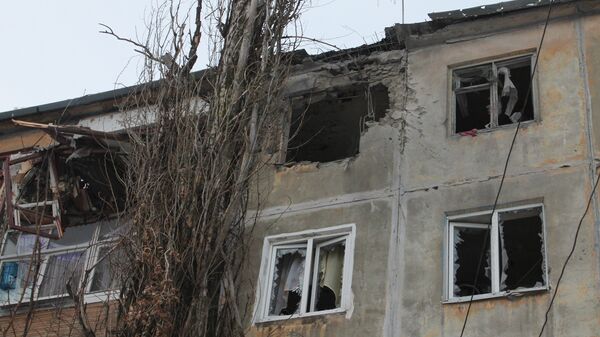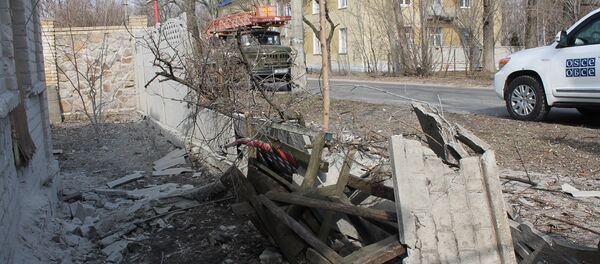On Amendments to the EU Gas Directive
The amendments proposed by the European Commission to the Gas Directive are not connected with US sanctions and are not aimed against anyone particular gas pipeline, Markus Ederer said.
READ MORE: Nord Stream 2 Project Terms, Cost Unaffected by Amendments to EU Gas Directive
"What it aims to do is complement and clarify the existing Gas Directive, inasmuch that it establishes EU jurisdiction on all pipelines coming to and going from the European Union. So it's not directed against or is not covering one particular pipeline but it covers all pipelines," he added.
Previously, the European Commission proposed amending the EU Gas Directive, which could extend certain rules to future offshore sections of gas pipelines and allow third-party access to the pipelines. At the moment, the Third Energy Package, to which the EU Gas Directive belongs and which is comprised of a number of rules for the European Union's internal market, does not apply to offshore sections of gas pipelines.
On Ceasefire Violations in Donbass
The European Union is concerned that in connection with the situation around the Joint Center on Control and Coordination (JCCC), there are numerous violations of the ceasefire in Donbass, according to the EU Ambassador to Russia.
On Monday, the Russian Foreign Ministry said that the Russian side was ceasing its activity in the JCCC, citing impossibility for further work of Moscow within the center over Kiev’s policies.
READ MORE: Conflict in Donbass Cannot Be Resolved Only Through Normandy Format — Kremlin
On Tuesday, Lt. Gen. Sergei Kostarev, the head of the Russian Armed Forces’ representative office at the JCCC, said that in recent months, the work of the Russian servicemen at the center had been limited by the actions of the Ukrainian side, including the introduction of biometric control system at the state border by Ukraine.
The JCCC started its work in Donbass in 2014 to ensure the implementation of Minsk agreements, the stabilization of the situation and compliance with the ceasefire regime in the region. The center was made up of generals of the Russian and Ukrainian general staffs.
On UN Peacekeepers Deployment in Donbass
Ederer noted that an agreement on deployment of UN peacekeepers in Donbas could become an important step toward establishing a lasting ceasefire in the region.
"There is consensus in the European union that we need a ceasefire which deserves its name along the line of control… And I have said before that an agreement on UN peacekeeping mission could be conducive to reaching such a ceasefire. And I'm still of the opinion that if such agreement can be found, this could be an important contribution to the implementation of the Minsk agreements," Ederer said, adding that a sufficient ceasefire would include de-confliction and "quitting all the weapons."
The ambassador stressed that, as far as specific conditions for the peacekeepers' deployment in the region were concerned, the issue was being discussed in other formats where "European institutions are not participating."
"It is being discussed between [Russian presidential aide] Vladislav Surkov and [US Special Representative for Ukraine Negotiations] Kurt Volker, it is being discussed in the United Nations Security Council," Ederer stressed.
In early September, Russian President Vladimir Putin expressed his support for the idea of sending peacekeepers to Donbass but insisted that the mission should be deployed solely along the contact line separating self-proclaimed Lugansk and Donetsk republics and government-controlled territory. However, Kiev wants UN peacekeeping mission to be stationed across the entire conflict-ridden Donbass region, up to the Russian border.
The conflict in the east of Ukraine erupted when in 2014, the Ukrainian authorities began a military operation against the two self-proclaimed republics in Donbass, Donetsk and Lugansk, which refused to recognize the new government that had recently come to power in Kiev after former Ukrainian President Viktor Yanukovich fled the capital amid protests. Despite the truce, clashes continue between the warring parties.
On the Visa Facilitation Process
The EU-Russia Joint Visa Facilitation Committee will hold its next meeting in Brussels in April 2018, Ederer told RIA Novosti.
READ MORE: US Anti-Crimea Sanctions a 'Reason for Confrontation With Moscow'
"We are talking with the Russian side in what is called the Joint Visa Facilitation Committee, the next meeting is taking place in Brussels in April," he said, adding that the visa facilitation system has been "quite successful."
Russia and the EU reached a visa facilitation agreement in 2007 to lower visa fees, simplify procedures and make multientry visas more accessible. However, after the relations between Moscow and the Union deteriorated significantly in the wake of the European crisis, the process of visa liberalization have remained stalled.





